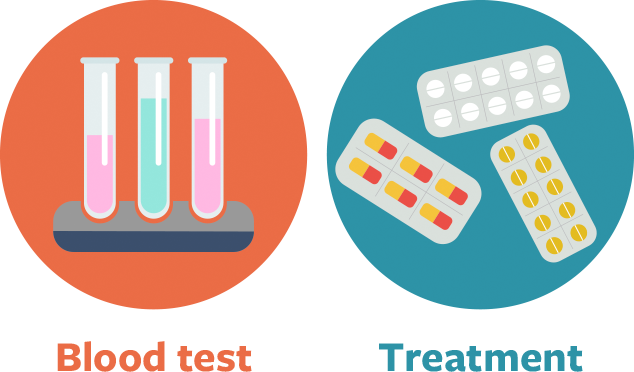Syphilis

Syphilis is an infection caused by a spiral-shaped bacterium called Treponema pallidum. Syphillis is transmitted by sexual contact by direct contract of the semen and vaginal secretions containing Treponema pallidum from an infected person. The number of Syphilis infections is increasing rapidly in Japan.
There are times when syphilis does not show symptoms after infection, and because of this, it is easy to overlook and increases the risk of spreading the infection. If a person was previously infected with syphilis, There is still a risk of being infected again. Generally, after an incubation period of about 3 weeks after infection, lumps and ulcers (skin changes) occur in the invaded area of treponemal. This is called Phase 1 syphilis. Symptoms disappear thereafter, and after a further incubation period of 4-10 weeks, various symptoms occur on the skin (second stage syphilis). The symptoms may go away in a few weeks without treatment, so they may be discovered for the first time in a subsequent blood test. Syphilis can be transmitted by oral sex, and symptoms can also appear in the mouth, but this is often overlooked.
When the infection progresses further, a lump called syphilitic gumma will start to appear on the skin, and will affect the heart, large blood vessels, brain, nerves, etc. several years later. This stage of syphilis can be very dangerous. Syphilis develops faster and is more atypical in people living with HIV. Neurosyphilis, for example, can be found early in people living with HIV, even though it is very rare and slow-growing in people without HIV.
How can I protect myself from Syphilis?
Syphillis is transmitted by sexual contact through direct contact of semen and vaginal secretions containing Treponema pallidum from an infected person.
When a pregnant woman is infected with Syphilis, it can be transmitted to the fetus through the placenta. It may cause a miscarriage or stillbirth, or it may cause congenital syphilis.
There is no perfect way to prevent syphilis. It is important to have yourself tested if you think you might be at risk to prevent the spread of infections between your partner. Condoms have the advantage of reducing contact with the mucous membranes and skin. This also reduces the risk of infection and prevents other sexually transmitted infections, but it does not completely prevent syphilis.
How do I know that I am infected? (signs and symptoms)
You can know if you have Syphilis through a blood test. It is important to always consult your doctor because it is possible to be re-infected with Syphilis, or it could remain positive for a while even after treatment
Symptoms of Syphilis may not appear for a long period after infection and even if there are symptoms, they may be difficult to notice. If you feel you are at risk, it is important to have an examination and start treatment as soon as possible.
Even if the treatment is completed, there is a possibility that you may become infected again.
Treatments
Penicillin-based antibacterial drugs work very well for acute cases. There are also alternative drugs if you are allergic to a penicillin-based drug.
With early-stage syphilis, a temporary high fever and rash called the Jarisch-Herxheimer phenomenon may be seen immediately after the start of treatment. This can be easily managed with anti-pyretic drugs and will disappear within 1-2 days. These symptoms may be confused with a reaction for drug allergy, so if you experience some unfamiliar symptoms, please consult a doctor.

